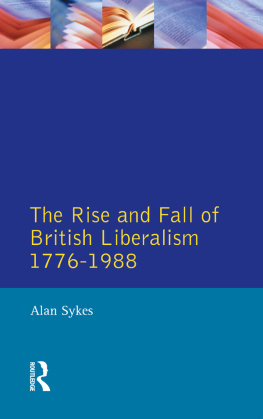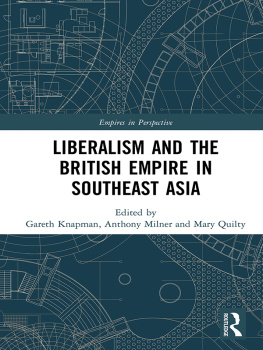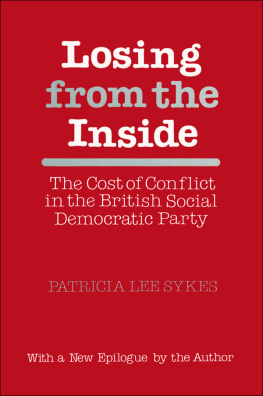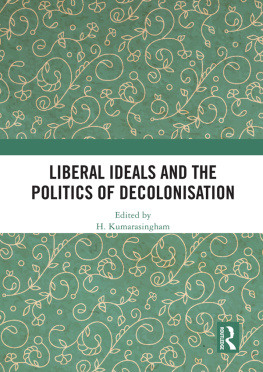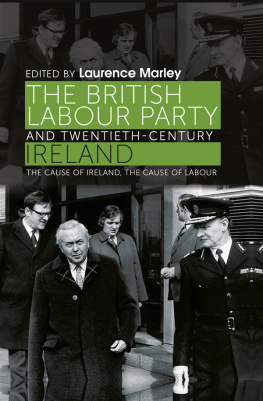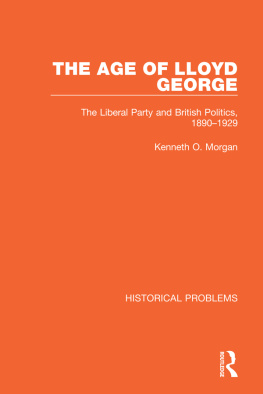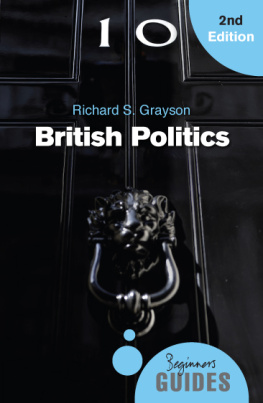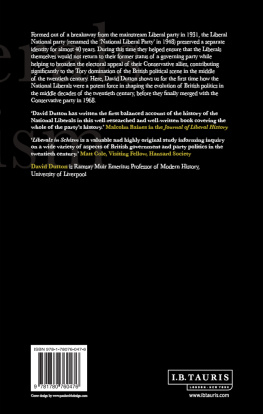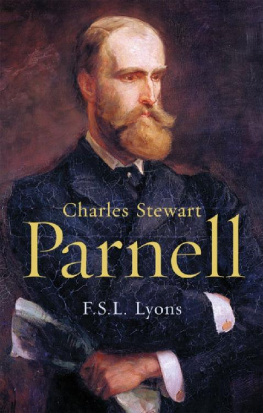The Rise and Fall of British Liberalism
17761988
The Rise and Fall
of British Liberalism
17761988
ALAN SYKES
First published 1997 by Adisson Wesley Longman Limited
Published 2014 by Routledge
2 Park Square, Milton Park, Abingdon, Oxon OX14 4RN
711 Third Avenue, New York, NY 10017, USA
Routledge is an imprint of the Taylor & Francis Group, an informa business
Copyright 1997, Taylor & Francis.
The right of Alan Sykes to be identified as author of this Work has been
asserted by him in accordance with the Copyright, Designs and Patents Act 1988.
All rights reserved. No part of this book may be reprinted or reproduced or utilised in any form or by any electronic, mechanical, or other means, now known or hereafter invented, including photocopying and recording, or in any information storage or retrieval system, without permission in writing from the publishers.
Notices
Knowledge and best practice in this field are constantly changing. As new research and experience broaden our understanding, changes in research methods, professional practices, or medical treatment may become necessary.
Practitioners and researchers must always rely on their own experience and knowledge in evaluating and using any information, methods, compounds, or experiments described herein. In using such information or methods they should be mindful of their own safety and the safety of others, including parties for whom they have a professional responsibility.
To the fullest extent of the law, neither the Publisher nor the authors, contributors, or editors, assume any liability for any injury and/or damage to persons or property as a matter of products liability, negligence or otherwise, or from any use or operation of any meth-
British Library Cataloguing-in-Publication Data
catalogue entry for this title is available from the British Library
Library of Congress Cataloging-in-Publication Data
Sykes, Alan, 1942
The rise and fall of British liberalism, 17761988 / Alan Sykes.
p. cm.
Includes bibliographical references and index.
ISBN 0-582-06057-5.ISBN 0-582-06041-9
1. Liberal Party (Great Britain)History. 2. LiberalismGreat
BritainHistory. 3. Great BritainPolitics and government.
I. Title.
JN1129.L32S94 1997 324.24106dc21
97-25080
CIP
Set by 35 in 10/12pt Baskerville
Contents
Without the more specialist monographs and articles by other historians, extended surveys such as this would be impossible. My great debt to the authors of the many excellent studies of the British Liberal party is, I hope, fully acknowledged in the footnotes. My colleagues, Hamish Scott and Michael Bentley, both read and commented on a late draft of this book; Bruce Lenman provided valuable guidance to the intricacies of late eighteenth century politics, Paul Vysny to those of the late twentieth. The misjudgements and errors that remain after their advice are, of course, my own. At Addison Wesley Longman, Andrew MacLennan has been the perfect editor on what has been a troublesome project. I would also like to thank Bill Jenkins for seeing it through the press.
Most of this book was written in difficult personal circumstances. My children, Tasha, Tom and Claude provided invaluable support, as did numerous friends. I am especially grateful to Peter Burns and Peter Bruce in Australia for chatting through the night hours, to Richard and Monique Paice, Ken and Sandra Duncan and Mike and Sue Broers for talk and hospitality, and to Adrian Berry, Patrick Jess, Jonathan Harfield, Andy Marrison, Simon Phillips and Prem Singh among many others for their kindness. Above all, I am grateful to M just for being there.
Writing of Victorian Liberalism in 1993, Jonathan Parry warned that a useful general history of the nineteenth century Liberal movement [is] almost impossible. One might write a casserole of a book but this would be an indigestible dish, of incompatible ingredients. Whatever unpleasant experience might lie behind this harsh criticism of the humble casserole, the point is well made. Describing the Liberal outlook in Britain alone is, to borrow Lloyd Georges description of negotiating with Eamonn deValera, like trying to pick up mercury with a fork. Mercury is funny stuff. Not only does it divide easily; it also tends to evaporate over time. Liberalism shared both these characteristics.
As a specific concept and a self-conscious political movement, liberalism only clearly emerged in the early nineteenth century. Its roots, however, lay far deeper in the British past and in interpretations of that past, particularly those developed during the political conflicts of the seventeenth and eighteenth centuries. Liberalism was pre-eminently a doctrine of opposition, whether to the pretensions of a monarch, a corrupted parliament, a self-serving aristocratic elite, an established church, or, indeed, any authority or regulation that restricted the legitimate liberty of the individual. Its classic formulations dated from the late eighteenth century, took their tone from the need to legitimise revolt, and expressed the Enlightenments faith in nature, reason and the overwhelming importance of the individual.
Thus, according to the Virginian Declaration of Rights of June 1776, all men were by nature equally free and independent, and have certain inherent rights namely, the enjoyment of life and liberty, with the means of acquiring and possessing property, and pursuing and obtaining happiness and safety. This became almost the standard formula. To the authors of the American Declaration of Independence, it was self-evident that all men are created equal, that they are endowed by their Creator with certain unalienable rights, that among these are life, liberty and the pursuit of happiness. In 1789, the French Declaration of the Rights of Man, in the presence and under the auspices of the Supreme Being, more cautiously listed those rights as liberty, property, security and resistance to oppression. Unlike the Americans, the French were apparently prepared to forgo happiness, just as long as they were not oppressed, but they shared the same basic ideas.
In this pattern of ideas, governments existed solely to preserve what the French called the natural and imprescriptible rights of man. To secure these rights, ran the American Declaration of Independence, governments are instituted among men, deriving their just powers from the consent of the governed whenever any form of government becomes destructive of these ends, it is the right of the people to alter or to abolish it. The limits of governmental powers were defined in written constitutions in the American states, in the American Federal Constitution of 1787, and in the French Constitution of 1791, each of which thus reconstituted their governments afresh. In their enthusiasm, the revolutionaries in France went further and introduced a new system of dating that made 1792 the Year 1 of Liberty. The experiment was shortlived, but the late eighteenth and early nineteenth centuries saw an efflorescence of constitutions and law codes in Europe, all proclaiming basic individual rights. In the form of declarations of rights safeguarded by constitutions, those essential characteristics of liberalism, individual liberty and personal property secured by the rule of law, were subsequently exported to the world, as a statement of the ideal towards which governments should strive. As the Economist observed in 1996, In the West, by and large, we are all liberals now.

